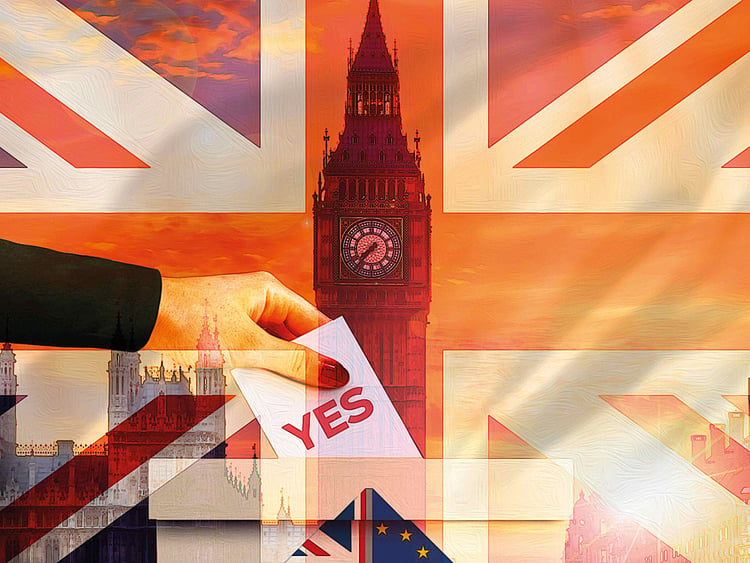According to Wikipedia — that great bucket of facts that are not necessarily true — buyer’s remorse is the sense of regret after having made a purchase. It is frequently associated with the purchase of an expensive item such as a vehicle or real estate.
Yep, and when it comes to buying into the bucket of half-truths peddled as facts by those who backed the notion that the United Kingdom would be stronger outside the world’s third-largest economy on its doorstep that is the European Union — it does indeed appear with each passing poll that the British public are having a growing sense of buyer’s remorse over Brexit.
Regular readers of this column will know that I have been consistently of the belief that Brexit was the worst mistake in British government policy and popular politics since … well, there is no equivalent.
For starters, aside from sanction-hit Russia, the UK will have the worst performing economy of the G7 group of nations.
Bleak economic outlook
Inflation is at its highest level since modern records were first kept, and the economic outlook is bleak. Its infrastructure is creaking, its public finances leaking red ink, its taxes rising and a general sense that a direction of travel forward is not happening. No, reverse seems to be the natural course right now.
Is it any wonder then that the wider public now think Britain was wrong to leave the European Union by 56 to 32 per cent?
Don’t forget that it’s almost two years since Britain left the EU on 31 December, 2020.
Sure, the pandemic had its effect, so did Ukraine.
But guess what? Those two elements also affected every other nation in the G7 and beyond. But it’s Britain that is faring worse.
Could it be leadership to blame? Yes, that is an element for sure. But that’s a leadership that also backed Brexit — and no one at the top is publicly calling for the UK to rejoin the EU.
They won’t either. But it is being mooted — some sort of an economic realignment with the EU to allow for trade to flow more freely. Over the past two weeks, various reports have emerged that British officials are quietly exploring some sort of new deal with Europe that would remove the paperwork and issues brought about by leaving the EU after 46 years of combined economic growth in the vast market of 560 million consumers.
The notion has been publicly panned by Prime Minister Rishi Sunak, in part no doubt to keep the right wing of his party and hardline Brexiteers in line.
Pollster YouGov has been regularly asking the public whether they think it was right or wrong to have voted to leave the EU since shortly after the 2016 referendum. Early polling revealed that more people believed that Brexit was the right decision than not up until the 2017 general election.
Public opinion has swung
Since then, with the exception of very brief periods in April 2020 and April 2021, public opinion has swung in the other direction and the latest results show the gap is at its largest yet, with those who think it was wrong to leave 24 points ahead of people saying it was right.
The great free trade bonanza that was supposed to happen when the UK was freed from Brussels’ shackles, simply hasn’t happened. George Eustace, a highly respected figure with the Conservative party and a former environment secretary, broke party ranks and said that the post-Brexit free trade with Australia “was not actually a very good deal” for Britain.
Following the 2017 general election the percentage of Brexiteers who believed voting to leave the EU was the right decision fell from roughly 90 to 80 per cent. According to YouGov, since June 2021, that percentage has fallen from 88 down to a record low of 70 per cent, while those who believe it to be the wrong thing to do has risen from 4 to an all-time high of 19 per cent
Naturally, remain voters, however, are more likely to have stood by their decision, with 91 per cent still believing it to be the wrong move to leave the EU.
Pretty much everyone except for those who peddled the hard-line Brexit cause now concede that the full exit was a mistake. There was a softer Brexit option, which would have meant staying inside the customs union, like Norway is — but that brushed aside in the mad rush to take back control of Britain’s border, cutting back migration and leaving Britain mostly for the Brits.
Last week, the head of the Confederation of British Industry called for changes in immigration policy, to reflect the fact that the UK actively needs people to move there — essential for the return to prosperity.
The vast majority of the public believe that Britain has not regained control of its borders since Brexit, and nor has the UK managed to control immigration.
One of the great misconceptions peddled by Brexiteers was that Britain could become a great low-tax, manufacturing and technology hub, much like Singapore is to the rest of Asia.
If only …
Right now, Britons are paying the highest overall tax burden since the Second World War, including a higher rate of corporation tax than the average across OECD nations, with most enduring stagnant living standards with public services that have crumbled.
Last week, for example, patients in one southern area of England were advised to call an Uber instead of an ambulance. How sick is that?
Sign up for the Daily Briefing
Get the latest news and updates straight to your inbox
Network Links
GN StoreDownload our app
© Al Nisr Publishing LLC 2026. All rights reserved.
